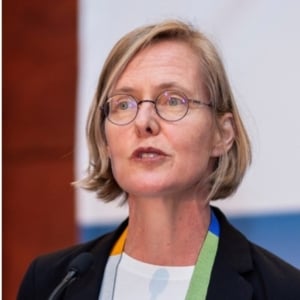Deeper understanding of informality and better use of technology can build more sustainable housing markets
Informality dominates Africa’s cities. Creative, chaotic hubs of job seekers, migrants, and young people—visibly overcome by traffic congestion, street trading, and informal housing—they are nonetheless vibrant economic centers and pivotal to Africa’s ability to achieve its economic growth expectations.
At the center of cities is housing. Adequate and affordable housing is a key driver of urban growth because, aside from the construction process itself, it directly affects where and how people live, work, and access services. When housing is carefully planned and integrated into city infrastructure, it can support efficient urban development, manage and leverage the opportunities of increased population density, and stimulate local economic growth.
But in Africa’s cities, more houses are built by informal than formal builders. There are more instances of lending for, and investing in, housing that happen informally—whether from hand to hand, through rotating savings and credit associations or cooperatives, or in the form of remittances—than are formally extended through regulated channels. And although informal processes are ultimately inefficient and expensive, opaque and exploitative, they are also nimble and responsive, with few barriers to entry. And critically, they are expressive of the priorities, needs, and capacities of the majority of people across the continent.
Technology offers valuable opportunities to support housing in this informal environment. By leveraging digital platforms, mobile technology, data analytics, and smart city systems, city governments and the people who work in them can build a bridge between the adaptive flexibility of the informal economy and the structured governance processes necessary to enable sustainable growth. The challenge for policymakers, regulators, and the private sector is not to constrain informal efforts with false trust in the formal, but rather to leverage them through better understanding of what leads to, emboldens, and calls for the informal. This will help investors—whether public or private, institutional or individual—target their housing investments correctly, for the right market, and will build a sustainable market accessible to and used by all the residents of the city.
Loading component...
Technological Opportunities
Blockchain technology can be used to create decentralized property registries or enforceable digital contracts that bypass cumbersome bureaucracy. This is being used by mortgage lenders in a number of countries to record liens on properties outside the formal cadastral system, which is less well trusted. The approach has also been tested in informal settlements, including in KUMASI, GHANA, where a single ledger of land holdings was produced and paper-based evidence was converted into a digital format.
Mobile apps in countries including NIGERIA allow informal builders and small-scale developers to access larger markets. These platforms facilitate fast, intuitive market participation while also enabling them to engage in formalized systems of trade and distribution. Users’ track records form a basis for lenders’ decisions about extending credit, which then supports growth and further development of small businesses.
Credit underwriting is an area where technology can help better quantify risk and thereby establish the opportunity for return. In an effort to promote financial access, the DJIBOUTI government has set up a guarantee fund that includes a provision of up to DF 10 million ($56,000) for what it calls “precarious households” that earn between $450 and $1,518 a year.
In 2013, RWANDA introduced the Land Tenure Regularization program, which involved the demarcation, land adjudication, digitization, and registration of all parcels of land. Rwanda has also launched an electronic certificate system, referred to as “e-Title,” so that landowners can quickly and cheaply access their title certificates on the National Land Authority’s official website.
Geographic information systems, drones, and satellite imagery can help map the informal economy. This can provide realtime data on informal settlements, markets, and economic activities, allowing city planners to understand and respond to informal dynamics more effectively. In the coming year, the Centre for Housing Affordability in Africa is going to explore these policies and practices with the Lincoln Institute for Land Policy in KENYA.
E-lending approaches can support rent-to-buy models. Blockchain technology reduces the cost of transactions, especially in terms of how it validates the truthfulness of data. This has had a profound impact on housing affordability for households and on market size and opportunity for developers. A housing developer in MOZAMBIQUE, for example, has found that by using this technology the homes it produces are now accessible to 80 percent of the population—previously they were accessible to only 3 percent of the population based on the existing mortgage model.
Opinions expressed in articles and other materials are those of the authors; they do not necessarily reflect IMF policy.








